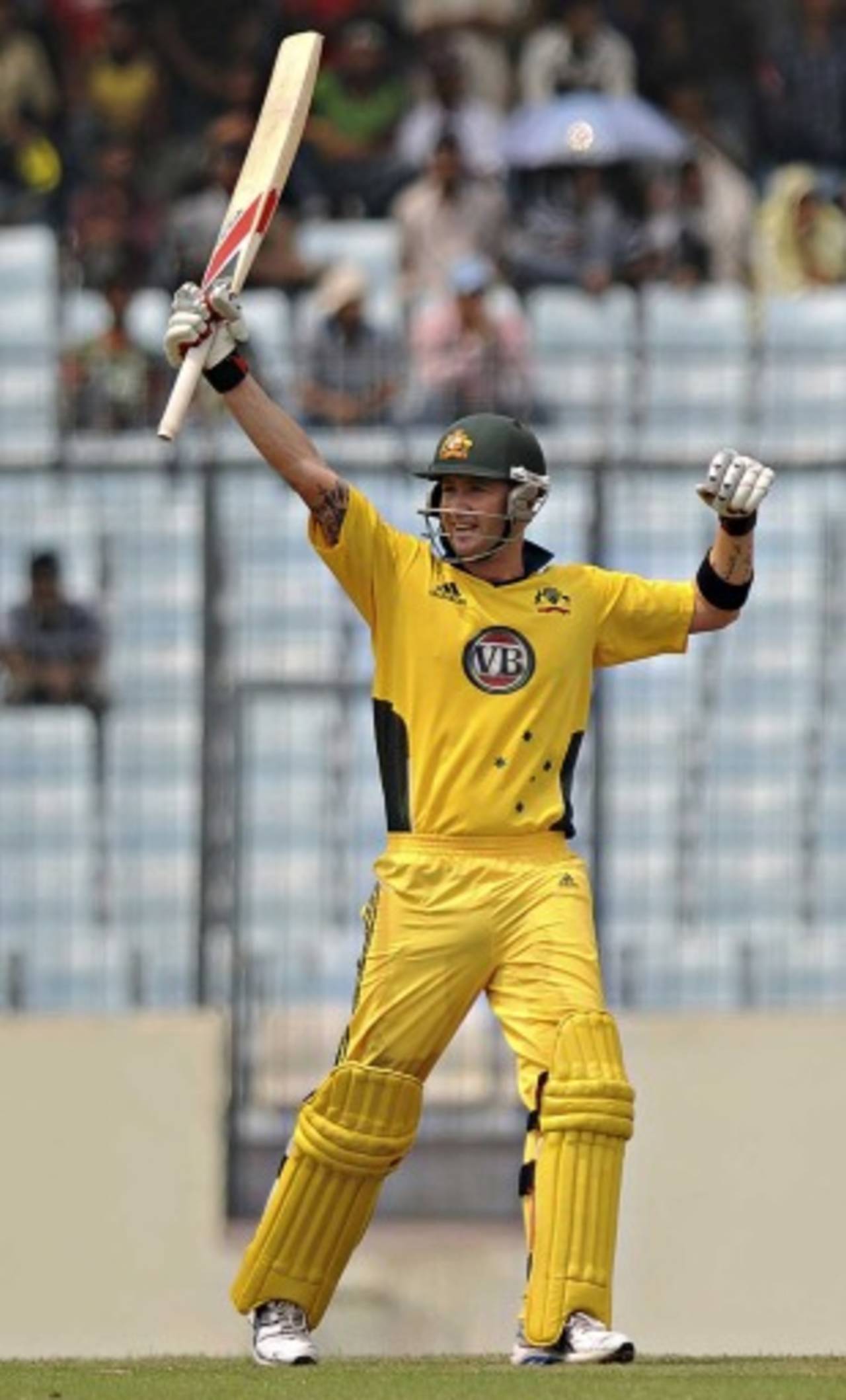A smooth transfer of authority
Michael Clarke began his Australian captaincy in much the same manner Ricky Ponting ended his
Daniel Brettig in Mirpur
09-Apr-2011

Michael Clarke began his tenure with an innings of substance • Associated Press
Two matches, two captains and two centuries. Continuity is one of leadership's more useful allies, and Michael Clarke took up where his predecessor left off by crafting a century of high quality to mirror Ricky Ponting's hundred against India in his final match as Australian captain.
That day in Ahmedabad, Ponting had driven himself to a first century in more than a year after Clarke threw his wicket away with an unsightly heave. In Mirpur, it was Clarke who held the innings together once Ponting had unsteadied it by contriving with Shane Watson to end an innings of 34 that was brimming with promise. For both men the change of office appeared to have done plenty of good. Ponting was relaxed, focused and timing the ball better than he had in months, Clarke sensitive to the rhythms of the innings yet powerful enough to strike a last-over six to crest three figures. In this way Ponting's visage at the crease was as significant as that of Clarke, though there was no question which man's picture would adorn the sports pages in Australia on Sunday.
Thus far, Clarke and Ponting, the two central characters in a captaincy episode of the sort seldom seen in Australian cricket, have played their roles more or less as billed. Clarke has shown himself to be an energetic and empathic leader, doing his best to speak to each player and spending plenty of time with his vice-captain Watson discussing tactics, strategy and the general well-being of the team. On the eve of the first match Clarke and Watson were often in conversation, and the captain could still be seen in his tracksuit, pacing around the team's Dhaka hotel, long after the rest of the players had retired to civilian clothes, or to bed.
Inhibited and indecisive at times while he has waited to take on the captaincy, here Clarke the batsman was emboldened by the responsibility. He turned a nifty half-century typical of his contributions for Australia down the years into a spinal innings that defined the success of his team on a pitch offering occasional help to the bowlers. The question of Clarke's dire recent Test batting remains, and it will until the Test matches in Sri Lanka in August, but lifting himself to guide his men out of potential peril against Bangladesh was promising for the future.
Batting with Cameron White and Michael Hussey, Clarke was a beacon of authority. White's struggles have gone on for a full season now, his lack of regular singles and twos now exacerbated by an apparent loss of the powerful blows he once used to catch up. Hussey too was forced to scrap, particularly against the parsimony of Shakib Al Hasan. Though he did not greatly outpace his partners, Clarke's was an innings of calm modulation, sprinkled with just enough boundaries to remind the bowlers who was in charge.
By apt contrast, Ponting kept to his corner, appreciating the solitude that had seldom been available when leading the Australian team overseas. He stepped out once to film a congratulatory video addressed to James Faulkner, the Ricky Ponting medallist at home in his native Tasmania, but otherwise remained monastically committed to his batting and his body, trying to enclose himself in the bubble of concentration so brilliantly utilised by Sachin Tendulkar over the past 18 months. He made a coruscating start when arriving at the crease at the fall of Brad Haddin's wicket, cracking five boundaries and one six when sauntering regally down the pitch to deposit Suhrawadi Shuvo beyond long-on. There were all the signs that Ponting would be freed up as a mere batsman, confidently reducing the bowler's zone of comfort to something the size of a postage stamp and pushing Australia to 79 for 1 in only 11 overs.
Clearly Ponting had been able to leave much behind with the captaincy, but an unhappy knack of getting run out is, it seems, still in his baggage. While Watson was arguably at fault for calling a third run, Ponting's sluggish response left him unable to beat a relayed throw, once again ending an innings that was entering its prime. Ponting lingered at the boundary's edge as the decision was clarified by replays, momentarily preventing Clarke's entry to the fray. Those few seconds represented the leadership change in microcosm - Ponting not leaving until it was absolutely necessary, Clarke driven by respect and convention to let him do so.
Daniel Brettig is an assistant editor at ESPNcricinfo